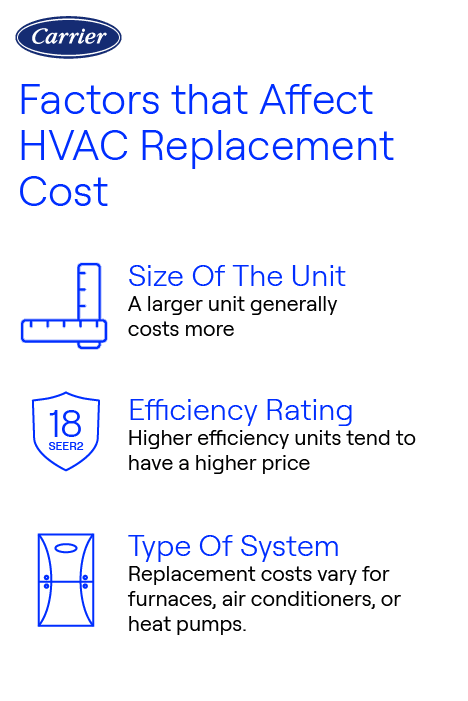How Much Does HVAC Replacement Cost?
Replacing an HVAC system is a significant investment, and the total cost can vary widely depending on factors like system type, size, efficiency rating, and installation complexity. On average, homeowners can expect to spend anywhere from a few thousand dollars for a basic system to significantly more for high-efficiency or larger setups. Understanding these variables can help you plan and budget effectively. For a detailed guide on options and what to expect, check out our HVAC replacement page.

HVAC Replacement Cost by Type
- Gas furnace: $3,800–$12,000
- Ductless mini splits: $2,000–$10,500
- Oil furnace: $2,500–$10,000
- Central AC: $3,000–$15,000
- Heat pump: $6,000–$25,000
- Geothermal heat pump: $12,000–$45,000
Factors that Influence the Total Cost to Replace an HVAC System
Jim Snyder, owner of Irish Air Now in Indianapolis, Indiana, explains several key factors that can influence HVAC replacement costs.
“The efficiency of the system, the staging of the equipment — whether it’s single-stage, two-stage, or variable-speed — the type of warranty you have, and any added accessories such as indoor air quality products will all impact the price,” Snyder said.
Snyder adds that the company performing the installation also plays a major role in overall cost.
“Sometimes buying the cheapest system can cost you the most in the long run if you’re dealing with an unreputable company or individual,” he cautioned. “It may end up costing you dearly later in repair or even replacement expenses.”
Let's dive deeper into the factors that can affect HVAC replacement cost.
Energy Efficiency (SEER Rating)
Another significant factor is the efficiency rating of the HVAC unit. Units with higher efficiency ratings are typically more expensive upfront, but they can substantially reduce your energy consumption and lower your monthly utility bills over time. Energy-efficient HVAC systems are designed to optimize performance while minimizing waste, making them a cost-effective choice in the long term. Learn more about HVAC efficiency ratings such as SEER2, HSPF2, and AFUE.
System Size
One of the primary factors impacting the HVAC unit replacement cost is the size of the unit. Larger units generally cost more to purchase and install compared to smaller ones. The size of the HVAC unit depends on the square footage of your home and its specific heating and cooling requirements. Consulting with a professional HVAC technician can help you determine the right size AC replacement for your space, as an improperly sized unit can lead to inefficient performance and higher energy bills. Learn more about "what size air conditioner do I need?" and calculating furnace size.
Ductwork
Labor
Season and Location
The timing and location of your HVAC replacement can also impact costs. Peak summer or winter demand can lead to scheduling backlogs, overtime, and surge pricing, while shoulder seasons often allow for faster installations and lower labor pressure. Regional factors such as local labor rates, permit fees, building codes, climate-zone efficiency requirements, and utility rebates further affect pricing. Site access—including attics, crawlspaces, high-rise rooftops, or rural properties—can also influence labor and equipment costs.
Type of Unit Needing Replacement


